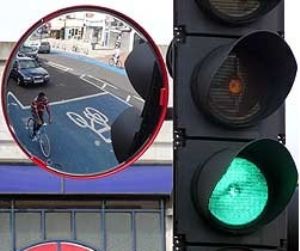 |
Pic of Trixi mirror: handyshippingguide |
Ask a professional truck, lorry or van driver his or her opinion of cyclists and you are 100 per cent certain to get, how shall we put it, a strongly-worded reply. Some, it's fair to say, regard them as the bane of their day-to-day lives, but most are professional enough to recognise they have as much right to be on the road as them.
There's no question, however, that driving on roads where cyclists are prevalent does present real challenges to heavy transport drivers. It is all too easy to miss or misjudge their presence - and before you know it a tragedy has occurred.
Which is why the latest idea from the Freight Transport Association (FTA) is a great initiative. The FTA this week responded to the rising numbers of fatalities and injuries caused to cyclists by heavy freight trucks in London by releasing a new Cycling Code for drivers. The Cycling Code contains a host of measures and gives advice not just to drivers of trucks and vans but also to cyclists, business and local authorities who manage the roads.
Specific measures include advice to fleet managers on reporting accidents and near misses to educating drivers about cyclist awareness and the use of Trixi mirrors.
“Cycling in London has doubled in the last 10 years. As operators of commercial vehicles regularly making tens of thousands of journeys every day to deliver essential goods and service to London residences and premises, we are acutely aware of the risks posed to other road users, especially cyclists," said the FTA.
“As responsible businesses we wish to take the initiative to promote a Cycling Code of best practice to be followed by vehicles."
Of course, telematics can play its part in helping to maintain the safety of both cyclists and truck and van drivers. Detailed tracking and GPS data can reveal and alert drivers to areas where cycling activity is heaviest, where accidents have occurred in the past and where Trixi mirrors are in place on street furniture and in particular on traffic signals. In other words, telematics add crucial - and potentially life-saving - depth and detail to the driver's knowledge of the city environment in which he or she is operating.
For more information on how iBox technology can help your fleet deal with these issues contact steve.green@iboxtechnology.co.uk
In the meantime, if you want to read the new cycling code in full visit this link:
http://www.fta.co.uk/export/sites/fta/_galleries/downloads/cycling/fta_cycling_code.pdf


